|
Genesis 10:25 -- Peleg
Genesis 10:25
From Dr. Bernard Northrup
The meaning of some names
Job
What Happened During Peleg’s Time?
There are many parts of the Bible which cause arguments. Here is one of them. One sentence, which has split parts of the creation movements into warring factions. Let's look at it.
Genesis 10:25 – and he was called Peleg because in his time the earth was divided.
In the 1858 a Christian named Antonio Snider proposed that the continents had all once fit together. His idea was ignored. In the 20th century, this idea was again proposed by an engineer named Alfred Wegener. During his lifetime he was mocked, ridiculed, and then ignored. It was only after his death that plate tectonics, and the concept of an original single landmass were accepted. Wegener then became a hero, but he was dead.
The knowledge of a single land mass which later divided is presented in the Bible. Just like much other scientific information, the Bible presented it thousands of years before science 'discovered' it.
The concept of an original single continent is implied on day 3 of creation:
Genesis 1:9-10a -- And God said, "Let the water under the sky be gathered to one place, and let dry ground appear." And it was so. God called the dry ground 'land,' and the gathered waters he called 'seas.'
"land" is eres (eretz), in that passage, and 'seas' is 'yam' which is singular. Thus, there was one sea, meaning the land was in the 'other' place and was one landmass. "Yam" is from an unused root, meaning 'to roar.' It is used in terms of a large body of water. While the surf, or storms, may be considered to be 'roaring,' there is also the option here of the idea that the rising of the land itself was not a quiet affair, but -- especially since it happened on the first half of day three -- a somewhat violent and noisy affair. This is in contrast to 'mayim' which is the 'waters' of Genesis 1 and the standard word for waters.
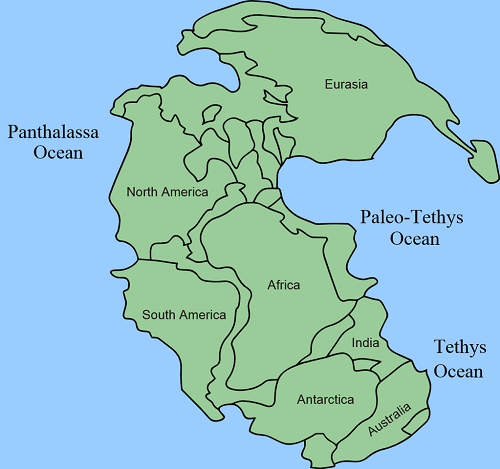
In Genesis 1:10 and 10:25, the word for 'land' is the same as Genesis 1:1 -- eretz. It's basic meaning in the original is simply 'that which is firm.' Hebrew usage later confined it to meaning 'earth, ground, land' etc. It is this which the Bible says was divided in the time of Peleg.
Some creationists associate the time of Peleg with the time of Babel, saying that what was divided were the peoples, and that the land itself was split apart at the time of the Flood. The shortened genealogies of the Masoretic do make it appear that Babel and Peleg may have been the same event, but the longer genealogies of the older texts as well as the words used in the Bible itself deny this idea. These were two separate devastating events, about 200 years apart.
The word in Genesis 10:25 for "divided" is Strongs 6385 – palag (PLG) – to split or to divide (only used for ‘divided’ 4 times). It is important to note here that Hebrew root words are combinations of consonants. So the basic word Peleg is the same as palag -- PLG. The other times it is translated 'divided' are
1 Chron. 1:19 repeats Gen. 10:25,
Job 38:25 – (NIV) "Who cuts (PLG) a channel for the torrents of rain, and a path for the thunderstorm?" (KJV) "Who hath divided (PLG) a watercourse for the overflowing of waters, or a way for the lightning of thunder?"
Psalm 55:9 – “Destroy, O Lord, and divide their tongues" (literally, ‘council’ – 3956 – from 3960 – lashon or lashan – to lick, to wag the tongue, to accuse, to slander; figuratively a fork of flame, a cove of water, a babbler, an evil-speaker, a talker, a wedge, a tongue)
The root PLG is translated "divided" those four times; it is translated as some kind of a body of water, such as a river, ten times; as "dividing" two times and the related word "pelach" as "piece" six times. Thus, the concept of dividing, pieces, and water are strongly connected with this word.
In the rest of the Bible, other words are used for "divided"
- Genesis 1:4 -- God divided the light from the darkness – Strongs 914 – badal – to separate or to distinguish
- The Gentiles were divided in their lands (Gen. 10:5) – Strongs 6504 – parad – to break through, to spread, to disperse, to scatter (thus, if the land in Genesis 10:25 being divided was a reference to people's migrations, as this verse is, this verb would have been used).
- Genesis 10:32 – by these were the nations divided – Strongs 5504 – cachar – profit, trade, merchandise, or to traffic
- common one is 2505 – chalaq – prim. root to be smooth, to apportion, to separate, to deal, to distribute, to divide, or to separate yourself
Other words derived from the PLG root:
Pelagos – old name for Mediterranean (Greek)
pelican
archipelagos – islands in the water
Pelagic deposits – shallow ocean deposits of geology
They all have to do with water.
The time of Peleg is claimed by many to be the same as the time of Babel. but
- The language used to describe the two events is radically different – if a simple dispersal had been meant, then ‘parad’ or ‘chalaq,’ or even ‘badal’ would have sufficed. But at Babel the people were scattered (‘puwts’ – 6327 – to disperse, to drive, to scatter, to spread abroad, to dash in pieces) and at the time of Peleg, the land itself was divided.
- In the older genealogy the two events are separated by about 200 years.
The late Dr. Bernard Northrup was a scholar of both Greek and Hebrew. He was a professor of these subjects and was called on numerous times by Bible translators (into foreign languages) to confirm they had the correct meaning in the texts.
The following are sections of Dr. Bernard Northrup’s writings on “Continental Separation and the Fossil Record,” an unpublished paper he gave to us to read, from pages 26-27.
The basic root PLG occurs in all three of the family groups of Noah’s offspring with similar meaning, almost always having to do with water. Aramaic is an exception. …the evidence that I have been able to investigate indicates that each of the three basic families of languages that departed from Babel used the basic root PLG to refer to the sea and to division by water.
…In the Semitic Family
PL – the root probably was used to refer to “a trench, an excavation,” in Ugaritic
PaL – has the basic root meaning “to split, to divide, to separate” in Hebrew, Aramaic Sanskrit, and Greek
PaLa’ – (with the final ‘ayin’) means “to split, to divide, to separate” in Hebrew
PaLaG is found in Genesis 10:25, Job 38:25, Psalm 1:3 (He is like a tree planted by PELEG of water…) and elsewhere with the meaning “to divide by water,” a meaning common to both Hebrew and Greek. In some contexts it deteriorates simply to mean “to divide” in Hebrew and Aramaic.
PaLaD means “to divide, to cut in pieces” in Hebrew
PuLaDah refers to an instrument of division, a sword, in Hebrew
PaLah means to separate, to divide off, in Hebrew
PaLakh means “to cleave, cut in pieces, divide, to plow a furrow” in Hebrew, Arabic and Aramaic.
PaLat means “to glide away, slip away, to flee away in haste, to escape” in Hebrew, Arabic and Aramaic
PaLaK means to “separate, to cut off, to divide, to single out one from a whole” in Hebrew and Arabic
PaLaL means “to fall down” in Hebrew. a parallel development is found in the root “to fall” from the related root (FaLaL) in English.
PaLaM means “to tear or cut into, to tear asunder” (as lightning splits the clouds) in Hebrew.
PaLaTS means “to be broken in pieces, to break into fragments, to quake greatly, to terrify” in Hebrew and in Aramaic
… Perhaps of special significance to our understanding of that which happened in Genesis 10:25 is this. The fact is that the root under consideration, PaLaG, often, if not usually, contains within it a reference to water. It is used to refer to a stream of water in Psalm 1:3. A similar meaning is found in Coptic, Ethiopic and Greek. The root is used in Akkadian to refer to irrigation canals, which carried the water throughout the farming land of Mesopotamia. A similar use is found in Syrian.
However, an examination of the Greek usage (of the family of Japheth) of the root letters PLG and PL clearly indicate that in the majority of its usages this root was used in relationship to the ocean. In Liddell and Scott, “A Greek English Lexicon,” the greatest Classical Greek lexicon, there are eighteen entries that contain the root PLG. To save time and space I simply will chart some of the meanings of the great variety of uses of PLG in this language of the family of Japheth.
…The Semitic root occurs in Greek, used as verbs of
- forming a sea or lake by a river that has overflowed
- Places to be flooded and placed under water
- the very act of flooding
- Crossing the sea
Indeed, the verb PeLaGoo means “to turn into sea, to flood.”
The nouns formed from PLG are used in the following ways
- Of the sea itself as “pelagian hala,” “the broad sea”
- Of animals living in the sea
- Of being out on the open sea
- Of seamen or ships
- Of the goddess Aphrodite who was born out of the sea
In the same way
- PeLaGisma means “an inundation”
- PeLaGismos refers to one’s “being at sea.”
- PeLaGitis refers to something or someone being “of” or “on the sea.”
- PeLaGobates means “one who walks upon the sea.”
- PeLaGodromos is “running or sailing on the open sea.”
- PeLaGolimen is a harbor formed in the open sea by means of sandbags
- PeLaGoploos means “sailing the sea.”
- PeLaGos means “the sea,” especially “the high sea, open sea, the main”
- PeLaGostolos means “on, sailing upon the sea.”
- PeLaGostrophos means “rowing through the sea.”
- PeLaGotrophos means “sea-nourished”
- the adverb PeLaGosde means “to, into or toward the sea.”
It is quite apparent that every Greek usage of this root involves the sea in some way.
The meaning of some names
There is other evidence that the time of Peleg was one of catastrophe. Look at the names of Peleg's brother, Joktan, and the names of his sons:
Joktan and his sons:
Joktan: “to diminish, make small, kill, destroy.”
his sons:
Almodad – agitation
Sheleph – to pull out or pluck off
Hazarmaveth –separation, also death/pestilence/ruin
Jerah – (comes from an uncertain root)
Hadoram – (unknown)
Uzal – (unknown)
Diklah –from a primitive root meaning to crush, crumble, beat in pieces, make dust
Obal— to make bare
Abimael – my father is God
Sheba – comes from a root meaning devastation or desolation
Ophir – uncertain, possibly ‘rich’
Havilah – circular, go in circles, twist, writhe
Jobab – cry out
The question remains, if this was such a catastrophic event, why is there only one line about it in Genesis 10:25? There are two responses to this question:
1. If we make reference to 9/11, everyone knows what we are talking about -- the planes hitting the Twin Towers, the Pentagon, and crashing in the field on September 11, 2001. The memory is seared into the American consciousness, at least. That event took a couple of hours in total. The time of Peleg continued for about 200 years of continual effects of continental separation: volcanoes, earthquakes, windstorms, tsunamis, mountains falling and others being built and, because the evidence is also of a further axis tilt at that time, the onset of the Ice Age. How could anyone ever forget? ...But we did....
2. Joktan's thirteenth son was Jobab. There is a very good bit of evidence that this is the same Job of the book of that name. See Are Job and Jobab the Same Person?
On the assumption that Job and Jobab are the same person, it is interesting that we find, in the book of Job, passing references to the devastations of that time:
Possible impact effects -- Job 9:5-7 (see "What Happened at the Time of Peleg" below)
Alexandrian LXX:
"Who wears out the mountain and men know it not: who overturns them in anger.
Who shakes the earth under heaven from its foundations and its pillars totter.
Who commands the sun, and it rises not; and he seals up the stars."
King James
"Which removeth the mountains, and they know not;
which overturneth them in his anger
Which shaketh the earth out of her place,
Which commandeth the sun, and it riseth not; and sealeth up the stars.”
New International Version
"He moves mountains without their knowing it
and overturns them in his anger.
He shakes the earth from its place
And makes its pillars tremble.
He speaks to the sun and it does not shine;
He seals off the light of the stars.”
Possible volcanism, rifting, magma – Job 28: 5-6,9-11
Alexandrian LXX
“As for the earth, out of it shall come bread: under it has been turned up as it were fire. Her stones are the place of the sapphire, and her dust supplies man with gold.
“…He has stretched forth his hand on the sharp rock, and turned up mountains by the roots: and he has interrupted the whirlpools of rivers and mine eye has seen every precious thing. And he has laid bare the depths of rivers, and has brought his power to light.”
King James
“As for the earth, out of it cometh bread: and under it is turned up as it were fire.
The stones of it are the place of sapphires, and it hath dust of gold.
“…He putteth forth his hand upon the rock; he overturneth the mountains by the roots.
He cuttest out rivers among the rocks; and his eye seeth every precious thing.
He bindeth the floods from overflowing; and [the thing that is] hid bringeth he forth to light.”
New International Version
“The earth, from which food comes,
is transformed below as by fire;
sapphires come from its rocks,
and its dust contains nuggets of gold.
“…Man’s hand assaults the flinty rock
and lays bare the roots of the mountains.
He tunnels through the rock;
His eyes see all its treasures.
He searches the sources of the rivers
And brings hidden things to light.”
Job 14:18-19
Alexandrian LXX
“And verily a mountain falling will utterly be destroyed and a rock shall be torn out of its place. The waters wear the stones, and waters falling headlong overflow a heap of the earth: and thou destroyest the hope of man.”
King James
“And surely the mountain falling cometh to naught, and the rock is removed out of his place.
The waters wear the stones: thou washest away the things which grow out of the dust of the earth; and thou destroyest the hope of man.”
New International Version
“But as a mountain erodes and crumbles
and as a rock is moved from its place,
as water wears away stones
and torrents wash away the soil,
so you destroy man's hope.”
Possible volcanic firestorms/winds – Job 1:16, 19
Alexandrian LXX
“While he was yet speaking, there came another messenger, and said to Job, Fire has fallen from heaven, and burnt up the sheep, and devoured the shepherds likewise; and I having escaped alone am come to tell thee.
…suddenly a great (in Greek: mega) wind came on from the desert, and caught the four corners of the house, and the house fell upon thy children, and they are dead.”
King James
“While he was yet speaking, there came also another, and said, The fire of God is fallen from heaven, and hath burned up the sheep, and the servants, and consumed them; and I only am left to tell thee.
…And behold, there came a great (in Hebrew: twisting) wind from the wilderness, and smote the four corners of the house, and it fell upon the young men, and they are dead.”
New International Version
“While he was still speaking, another messenger came and said, “The fire of God fell from the sky and burned up the sheep and the servants, and I am the only one who has escaped to tell you!”
…when suddenly a mighty wind swept in from the desert and struck the four corners of the house. It collapsed on them and they are dead.”
Job 18:15
Alexandrian LXX
“It shall dwell in his tabernacle in his night: his excellency shall be sown with brimstone.”
King James
“It shall dwell in his tabernacle, because it is none of his: brimstone shall be scattered upon his habitation.”
New International Version
“Fire resides in his tent; burning sulfur is scattered over his dwelling.”
Job 27:20-22
Alexandrian LXX
“Pains have come upon him as water, and darkness has carried him away by night.
And a burning (literally: fiery) wind shall catch him, and he shall depart, and it shall utterly drive him out of his place. And he would fain flee out of his hand.
King James
“Terrors take hold on him as waters, a tempest stealeth him away in the night.
The east wind carrieth him away, and he departeth; and as a storm hurleth him out of his place.
For God shall cast upon him, and not spare: he would fain flee out of his hand.”
New International Version
“Terrors overtake him like a flood;
A tempest snatches him away in the night.
The east wind carried him off, and he is gone;
It sweeps him out of his place.
It hurls itself against him without mercy
As he flees headlong from its power.”
Possible tsunamis, ocean storms – There is an oblique reference in Job 7:12 to something interesting:
Alexandrian LXX
“Am I a sea, or a serpent, that thou hast set a watch over me?”
King James
“Am I a sea, or a whale, that thou settest a watch over me?”
New International Version
“Am I the sea, or the monster of the deep,
that you put me under guard?”
Why would the sea be put under guard unless there was a constant watch for tsunami activity? When a tsunami has been generated, usually by an earthquake, the sea pulls far back from the shore first and then the giant wave rushes in to inundate the land. Why the reference to the whales or monsters? Because if the tsunami were big enough, the sea would pull back so far as to leave some of these animals stranded on the ocean floor until the giant wave rolled in.
What Happened during Peleg's Time?
No matter whether one uses the gravitational model of earth formation or the plasma model, it is generally agreed that the heavy radioactive elements were in the mantle and core to begin with. The heating from their decay first drove water out of the rocks, minerals, and crystal lattices, producing the massive explosions which initiated the Flood of Noah. The heating did not stop then, however, but continued, resulting in the melting of the rocks themselves.
When rocks are heated to the melting point, most types gain 10% in volume. This translates into about a 5% increase in circumference. Thus, the melting of the rocks under the crust would have started to exert tremendous pressure under the crust. As the pressure increased, there came a time when all that was needed was some kind of trigger event to start an 'unzipping' effect, which is what we see along the Atlantic Rift.
If we look at the following map, and put the continents back together in our mind, we can see how close this series of asteroid hits was. We know where the craters are and we know that this dates after the time of both the Flood as well as Babel.
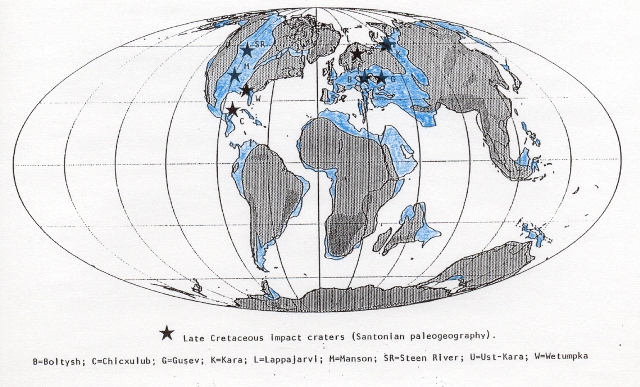
It would seem that this series of impacts would certainly be enough to trigger the cracking the crust and the expansion of the size of the earth by about 5%.
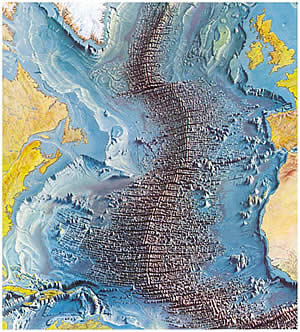
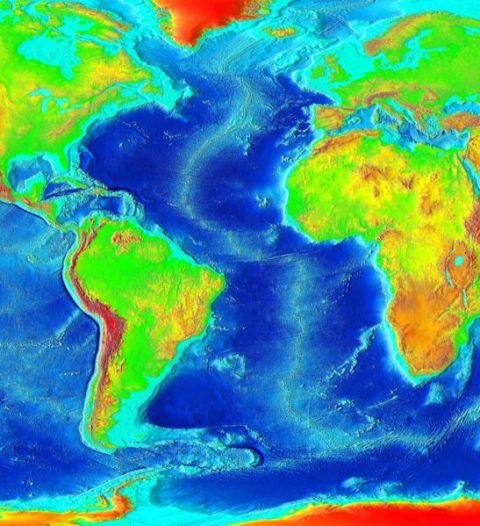
The earth did not just crack along the Atlantic, although that is the most dramatic split. The crustal plates all responded to the trigger event and the pressure underneath:
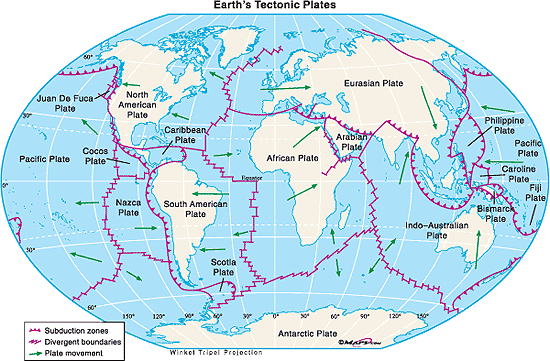
As the unzipping of the Atlantic forced the Eastern and Western Hemispheres apart, massive 'crumpling' was occurring on the western edge of the Western Hemisphere and the eastern edge of the Eastern Hemisphere.
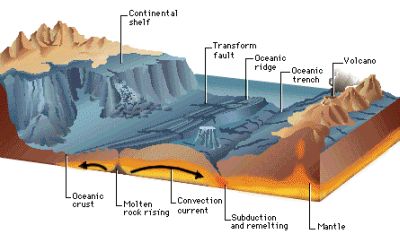
This resulted in several things:
1. Massive subduction and resulting trenches under the ocean along the boundaries
2. Large, sharp "young" mountains being upthrust
3. The Pacific Ring of Fire
Subduction resulting in the trenches along the eastern edge of the Eastern Hemisphere result in the deepest places known in the ocean. These are associated with the Pacific Ring of Fire which involves strings of volcanoes in a horseshoe around the Pacific Rim:
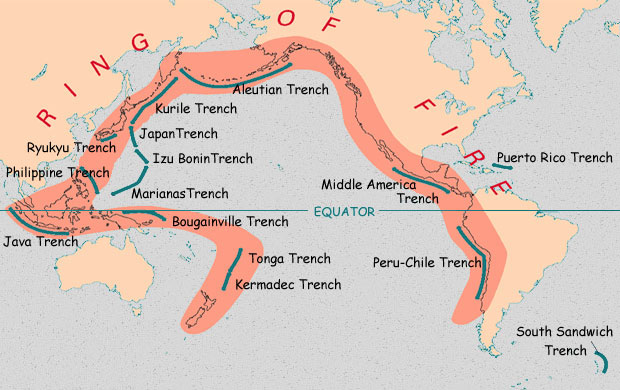
The volcanoes in Indonesia are some of the most active in the world and are part of the Ring of Fire
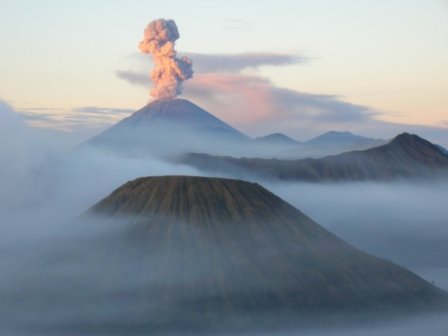
The sharp, newly uplifted mountains at this time include the Andes, the Himalayas, the Rockies, the Cascades, the Sierra Nevadas, the Alps, etc.
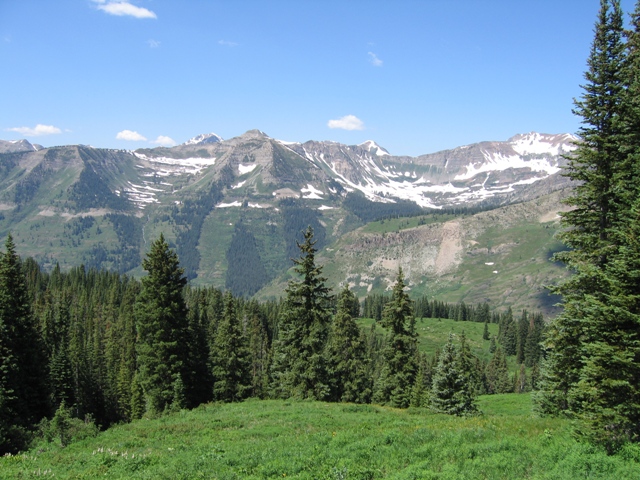
In the picture above, the Rockies can be seen above some beautiful green meadows and lush evergreens. The soil of this lower area would have been washed down from the Rockies as they uplifted, leaving massive amounts of deposition along their base and into the Great Plains.
The same thing can be seen with the Himalayas, below:
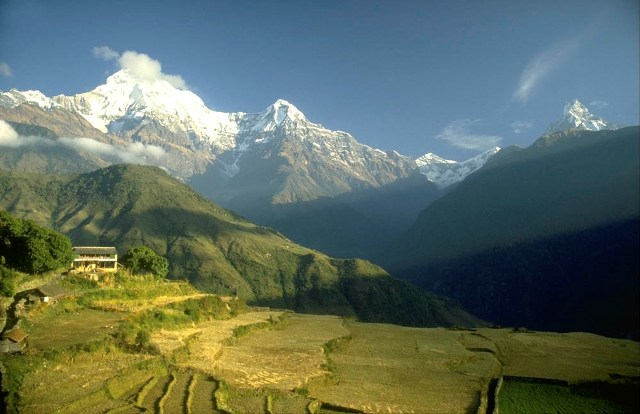
Huge alluvial fans of material washed off the Himalayas and other of the mountains which rose up during the time of the continental division provide some of the richest agricultural lands today in the lower elevations.
One other major event at the time of the Peleg continental division was an impact a little away from the others, in India, resulting in the Lonar Crater.
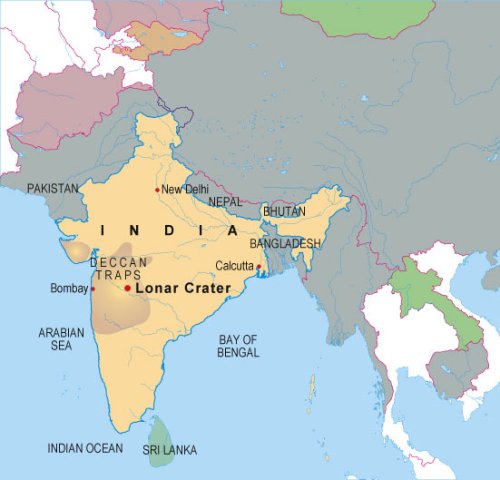
It was big enough to trigger a mantle plume not on the other side of the world, as the Antarctic impact had done at the time of Babel, but right next to it. The outpouring of material from this impact resulted in what are called the Deccan Traps in India today.
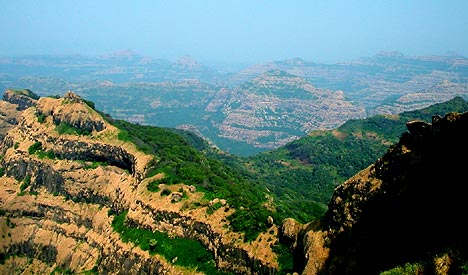
This type of earth movement during Peleg's time probably lasted for about 200 years. The evidence from both the Siberian Traps and the Deccan Traps indicates they were poured out under air, not water, thus denying the idea that these are related to Noah's Flood. The Bible and geology agree that there were three times of world-wide catastrophe: the Deluge, the time of Babel, and the time of Peleg. Legends and stories from around the world remember these three as separate events.
return to the beginning
continue to Genealogies: Genesis 5, 10, and 11
|











